Shizuoka, Japan, 21 November 2013 - Before leaving Tokyo for other engagements this morning, His Holiness the Dalai Lama gave an extensive interview to Yoshiko Sakurai, who he knows well. She participated in scientific discussion with him at Chiba Institute of Technology and was present for his meeting with parliamentarians yesterday. She began by asking how he felt that meeting had gone; he replied:
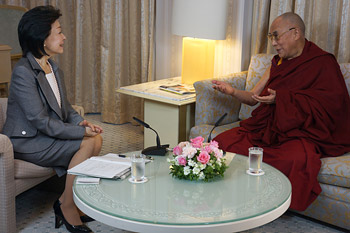
|
Yoshiko Sakurai interviewing His Holiness the Dalai Lama in Tokyo, Japan on November 21, 2013.
Photo/Jeremy Russell/OHHDL
|
“I am a promoter of democracy, which is why I have brought the role of the Dalai Lamas in Tibetan political affairs to an end. Meeting with the parliamentarians was an honour because they are representatives of the people; it’s they in whom the people have placed their trust. This was the second time I’ve met with them and they responded with warmth and genuine interest.”
Ms Sakurai recalled that His Holiness had appealed to the parliamentarians to be compassionate and ethical and wondered what effect that might have. He clarified that Japan is an important nation, a highly developed nation, but at the same time is still in touch with its longstanding, ancient traditions. That means it is able to combine the deeper values of the past with a more modern way of life. If we behave like robots, technology can become a destructive force, which is sad, but what differentiates human beings from robots is that we are able to cultivate compassion.
Motivation is what drives human action. Just as religion can become distorted if it takes advantage of people, if politics are motivated by compassion, love and respect, they can be clean and beneficial. It is only when politicians place their own interests first that politics becomes dirty and the people’s trust in betrayed. He suggested that the best way for any individual to be successful is to be honest and truthful. Because that leads to trust. And trust is the basis of real friendship, which as social animals is what we need.
Asked to respond to reports that the Spanish National Court has ordered the arrest of past Chinese leaders for their actions towards Tibet, His Holiness said it was quite complicated. These leaders grew up under a totalitarian system which leaves little room to exercise personal discretion. They were cut off from the outside world and in most cases cut off from reality. He cited the example of a PLA general who, when he reached Chamdo in 1950 and met Tibetan officials, wept as he told them that it was because of imperialist interference that they had found themselves on opposing sides. He was completely ill-informed. His Holiness suggested that if the Chinese leaders had been living in a free country it might be appropriate to hold them to blame, but he tended to think that they were not free to think for themselves. At the same time he appreciated that this case reveals a serious concern for human rights.
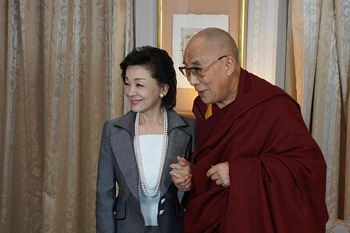
|
Yoshiko Sakurai and His Holiness the Dalai Lama after their interview in Tokyo, Japan on November 21, 2013.
Photo/Jeremy Russell/OHHDL
|
“When the PLA reached Tibet, they came under the slogan of liberation. The party members I met in 1954 were committed to creating a new society, an equal, classless society. Their economic outlook was Marxist and focussed on equal distribution, which I found attractive then and still feel sympathetic to now. However, in about 1956 they began to introduce a more totalitarian system; they became isolated from reality, which would continue until Deng Xiaoping began to open China up and stress the need to seek truth from facts. Jiang Zemin emphasised development, while Hu Jintao stressed the need for harmony. But to achieve it he employed force and suppression, which was quite the wrong method. Harmony must come from trust, which is the basis of friendship. When you have suspicion and fear instead, there will be no harmony. I sometimes think these leaders need lessons in basic psychology. Their so-called liberation has brought only misery and mistrust.”
He observed that while the Cultural Revolution was going on it was praised in the media, only to be decried as a mistake when it was over. He said he often meets Chinese who tell him that until they were able travel outside China their impression about many things was completely wrong.
“The new leader seems to be more realistic in his approach. He seems to admire Hu Yaobang who visited Lhasa in the ‘80s, apologised for what had happened and promised to a reduction of the Han population. He was the Youth Leader when I was in Peking.”
Ms Sakurai said she hopes things will work out for Tibet and His Holiness told her:
“The Tibetan spirit is becoming stronger and will long remain so, even though the situation now is so harsh. Meanwhile, China will change. During the Cultural Revolution, drastic action was taken to eliminate ‘old ways of thinking’ which failed. Religion, for example, is related to emotions and human feelings. The Chinese Buddhist population, reliable sources tell us, is now 400 million, with many of them interested in Tibetan Buddhism. I think Buddhism will survive.”
The final question was about how to contribute to children’s education in the home. His Holiness stressed that parents should show their children affection and spend time with them. This is crucial when they are still very young. He said leaving them in front of the television may have some educational value, but is no substitute for real affection. He cited his own experience, explaining how his mother had been a simple, illiterate peasant, but she showered affection on him, which he appreciates to this day.
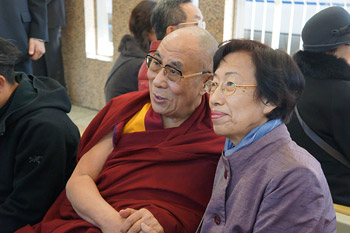
|
Member of the public engaging with His Holiness the Dalai Lama as he waits for the train to Shizuoka at the Tokyo Railway Station in Tokyo, Japan on November 21, 2013.
Photo/Office of Tibet, Japan
|
Commuters and other travellers at Tokyo station were taken by surprise when they realised the Dalai Lama was walking down the platform towards them. Others were equally taken aback when they discovered he was sitting in a small glass waiting room, waiting to board the Shinkansen (Bullet Train) to Shizuoka. Many just whipped out their mobile phones to take a picture, but some approached to greet him, shake his hand and have their photos taken with him.
Arriving in Shizuoka he was met by his old friend and veteran politician Seishu Makino. A very short drive took him to lunch with friends and suppos prior to his public talk in the afternoon.
In a hall of 2000 people, after Mr Makino had introduced him with a mixture of Japanese formality and friendliness, His Holiness made the point that he does not regard old friends like him as just supporters of Tibet, but as supporters of justice. Then he began his talk in his customary manner.
“Brothers and sisters, we spend too much time dividing people into ‘us’ and ‘them’, thinking that overcoming ‘them’ will be a victory for ‘us’. These days we are too interdependent for this to be true. Whether I’m speaking to an individual or a public gathering like this, I never think of myself as a Buddhist, a Tibetan or even as the Dalai Lama, which would only tend to set me apart from others. As human beings we are all the same. We all want a happy life and have a right to lead it, which is why I try to promote the idea of the oneness of humanity.”
He said that as a 78 year old human being, born in 1935, he had observed a succession of wars. Some historians suggest the 200 million people died through violence in the 20th century. The Second World War brought huge difficulties here and in Germany, but even Britain faced great trouble when it came to an end. His Holiness emphasised that such use of force is out of date. We need instead to solve our problems by talking to each other. This needs to become a century of peace, a century of dialogue.
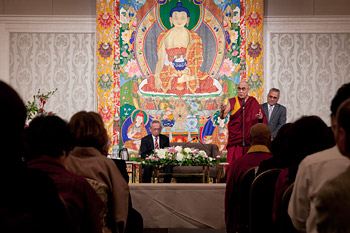
|
His Holiness the Dalai Lama speaking during his public talk on "Shift to a Peaceful 21st Century" in Shizuoka, Japan on November 21, 2013. Photo/Office of Tibet, Japan
|
“In Hiroshima, three years ago, I caused a stir by saying that we won’t achieve peace merely through prayer, we need to take action. It’ll take self-confidence and determination. Something about which we must take action is poverty. There are millions living below the ‘poverty line’, millions of children with malnutrition, and mothers distressed because they can’t feed them. It’s unthinkable that such a gap exists between rich and poor. What we require is greater compassion and the sense that we all live in one human family.”
He asked where we start to develop such compassionate feelings. Relying on religion is one way, but if we accept a religion we should practise it sincerely. Religion employs different methods, such as accepting the role of the creator on the one hand or the principle of causality on the other. The difficulty is that relying on this religion or that will not be suitable for everyone. Therefore, ethics need to be cultivated in a secular way. And it will be appropriate if secular ethics can be introduced into our secular education system. If we do this it will be possible to create a more peaceful world in this 21st century.
His Holiness invited questions from the audience and a long line soon formed to queue up for the opportunity to ask one. The first was about the future of Japan, which he answered saying:
“That’s up to you.”
Another questioner wanted to know the difference between love and compassion and His Holiness replied that due to short-sightedness people tend to look after only themselves; they become self-centred. The best way to secure your own benefit is to serve others, which is to be what he calls wisely selfish as opposed to foolishly selfish.
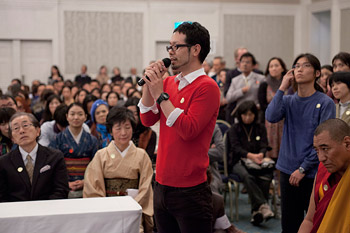
|
An audience member asking His Holiness the Dalai Lama a question during his public talk in Shizuoka, Japan on November 21, 2013. Photo/Office of Tibet, Japan
|
A musician asked what contribution he could make to a better world and His Holiness told him of the value of creating inner peace, that changing yourself is ultimately how you can help others too to change. He added that he can also convey this message to others when he performs. When another man asked what advice he could give to a depressed friend who says he wants to die, His Holiness said it is important to tell him when he’s in such a state to remember that this doesn’t only affect him and many others are worse off than he is. Leading a meaningful life takes warm-heartedness and intelligence.
Finally, a young woman thanked His Holiness for coming to Japan and reminded him that the people of Fukushima are in trouble and asked him not to forget them. He replied:
“I’m a Buddhist monk and I believe we each have a responsibility for the welfare of the whole world. I think you Japanese Buddhists think like this too. We don’t pray for our own benefit alone; we pray for everyone. Try to contribute as best you can. Since 1967, when I first came to Japan, each time I’ve seen more smiles, so I’ll never forget you; you are all very close in my mind.”
And the hall rang with fulsome applause.